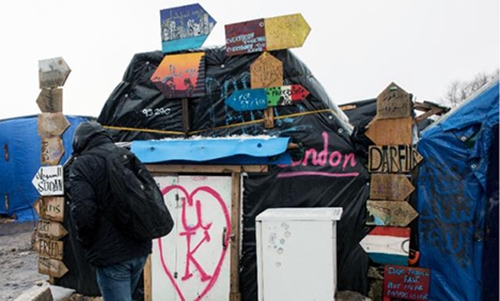Calais 'Jungle' eviction delayed as Belgium tightens border
A French court on Tuesday postponed a ruling on the demolition of half the "Jungle" refugee camp in Calais, while Belgium reinstated border controls fearing an influx of migrants from the camp.
Emotions were running high in the camp on the outskirts of the northern French port city of Calais near the entrance to the Channel tunnel, with many residents refusing to leave despite a 1900 GMT deadline to vacate its southern half.
Charities working in the Jungle had been nervously awaiting a ruling from a court in Lille, where they had challenged the eviction order.
But the court said a decision was not possible before Wednesday or Thursday, as it began hearing testimony from 250 migrants and 10 NGOs.
At Tuesday's hearing, activists demanding the suspension of the planned evacuation denounced what they called a "bungled" government response to the crisis.
Meanwhile, Belgium said it had temporarily reintroduced border controls with France to halt a feared influx of migrants, notably to the port of Zeebrugge in hopes of getting on a ferry to Britain.
"We have informed the European Commission that we will temporarily depart from Schengen rules," Interior Minister Jan Jambon said in Brussels in the latest blow to Europe's 26-country borderless zone.
"We will carry out border controls at different strategic locations, at spots used by smugglers which the police have detected," he said.
He said the operation would involve 250 to 290 police officers carrying out checks around Zeebrugge and the port of Bruges, a top tourist destination.
"We want to avoid tent camps like Calais in Belgium at all costs. It's a question of maintaining order," Jambon said.
The Jungle has also played into fraught discussions about Britain's possible exit from the European Union.
Some British opponents of "Brexit" say they would lose the ability to call on France to stop the flow of refugees sneaking aboard lorries and ferries in Calais if Britain leaves the EU.
- 'Nowhere to go' -
The migrants in Calais make up a tiny fraction of those fleeing war and poverty in the Middle East and Africa. They are often drawn to Britain by family or community ties, or because of a shared language.
Many Jungle residents appeared to be standing firm.
"I don't have anywhere else to go," said John, a 28-year-old Sudanese national.
"We don't want to leave Calais because we don't want to get further away from England, which is still our goal."
There is a heated debate over the numbers of people living in the camp, which sprang up on a former toxic waste dump.
Local authorities say there are 3,700 residents, and between 800 and 1,000 will be affected by the eviction.
But charities say a recent census they conducted found at least 3,450 people living in the southern part of the camp, including 300 unaccompanied children.
Last week, Calais town hall said it was responding to increased tensions caused by migrants throwing stones and other projectiles at lorries and security forces.
But it also condemned members of far-right groups who loiter outside the Jungle to harass and even attack migrants.
- 'Terrible conditions' -
The French government has presented the eviction as an effort to improve living conditions for the migrants.
"We must provide a humanitarian response to the situation in Calais," Prime Minister Manuel Valls said Tuesday.
"We are in the process of evacuating methodically... because we can't accept the terrible conditions in which the migrants are living... and we can't continue to have a shantytown on the edge of Calais," he added.
The evicted migrants have been offered heated accommodation in refitted containers set up next door to the Jungle, but many are reluctant to move there because they lack any communal spaces and movement is restricted.
They have also been offered places in some 100 accommodation centres dotted around France.
The demolition "risks displacing migrants to other camps in the region, which is only moving the problem somewhere else," said Vincent De Coninck, a volunteer with Caritas.
Conditions are worse in other camps along the northern French coast, where fewer charities are operating and migrants are more exposed to the winter weather.
Related Posts

